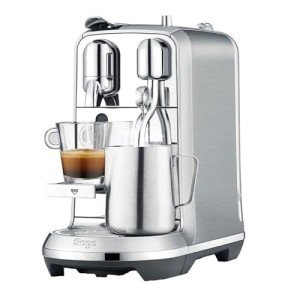The Rise of Home Espresso Machines: A Comprehensive Guide
As coffee fans continue to seek fresh and tasty brews at home, the appeal of home espresso machines has actually risen over the last few years. No longer just the domain of coffee shops and cafe, these machines empower individuals to craft barista-quality espresso beverages from the comfort of their kitchen areas. This article will check out the various types of home espresso machines, their features, and factors to consider for choosing the right one. Furthermore, it will offer a choice of FAQs to help prospective buyers make informed choices.
Kinds Of Home Espresso Machines
Home espresso machines can be classified into numerous classifications based on their systems and user-friendliness. Each type has its distinct functions, pros, and cons.
| Type | Description | Pros | Cons |
|---|---|---|---|
| Manual Espresso Machines | Needs the user to manually manage the developing process, involving strategies like pulling a lever to develop pressure. | - Complete control over brewing process - Compact style | - Requires skill and practice - Time-consuming |
| Semi-Automatic Machines | Machine automates water circulation and pressure, however the user still controls the dosing and period of the brewing procedure. | - Balance of automation and control - Versatile | - Learning curve for perfecting methods |
| Completely Automatic Machines | Automates the whole developing process, from grinding to brewing, often with programmable settings for personalized drinks. | - Extremely easy to use - Quick and practical | - Less control over the brewing process - Higher price point |
| Pill or Pod Machines | Utilizes pre-packaged espresso capsules or pods to develop coffee rapidly and quickly. | - Extremely simple to use - Minimal cleanup | - Limited flavor range - More pricey per cup than ground coffee |
| Super-Automatic Machines | Combines features of completely automatic machines with built-in mills, permitting users to brew entire bean espresso and milk-based beverages with one touch. | - All-in-one benefit - Ideal for milk-based beverages | - Often the most pricey - Can be bulky |
Functions to Consider
When choosing a home espresso machine, prospective purchasers must think about the following features to ensure they choose a machine that satisfies their needs:
Grinder Type:
- Built-in grinders can supply fresher grounds but might need more maintenance.
- Separate mills enable for more personalization of grind size.
Pressure:
- Look for machines that produce at least nine bars of pressure, which is optimum for brewing espresso.
Water Temperature Control:
- Machines with adjustable temperature level settings permit for much better extraction of flavor from beans.
Milk Frothing Options:
- Consider whether you desire a manual steam wand for frothing or an automatic milk frother for benefit.
Relieve of Cleaning:
- Machines with detachable parts and self-cleaning functions substantially minimize cleanup time.
Size and Design:
- Ensure the machine fits easily in your cooking area and lines up with your visual choices.
Budget:
- Set a budget before beginning your search, as rates can vary significantly from affordable designs to high-end machines.
Benefits of Home Espresso Machines
Owning a home espresso machine offers many benefits:
- Cost-Effective: Over time, brewing espresso in your home can conserve coffee enthusiasts cash compared to regular coffee shop gos to.
- Customization: Users can explore different beans, grind sizes, and developing methods to find their perfect cup.
- Convenience: The ability to brew espresso whenever gets rid of the requirement to go out to a coffee shop, particularly helpful throughout late nights or mornings.
- Quality Control: With a home machine, individuals have total control over the quality of active ingredients and developing processes.
Drawbacks of Home Espresso Machines
Nevertheless, there are some drawbacks to think about:
- Initial Investment: High-quality espresso machines can be pricey, needing a considerable upfront financial investment.
- Knowing Curve: Mastering the art of espresso developing can require time and practice, which might be intimidating for newbies.
- Maintenance: Like any appliance, espresso machines need routine cleansing and maintenance to ensure optimal performance.
FAQs
1. What is the very best type of home espresso machine for beginners?
Response: For novices, a semi-automatic machine is typically suggested as it offers a balance between control and automation, allowing you to learn the fundamentals without overwhelming complexity.
2. How much should I invest in a home espresso machine?
Response: Entry-level machines can start around ₤ 100 to ₤ 300, while higher-end designs can vary from ₤ 500 to over ₤ 2000. It's necessary to set a budget based upon your expected use and preferred features.
3. Do I require a separate grinder?
Answer: While some espresso machines feature built-in grinders, investing in a different grinder enables higher modification and makes sure much better quality grounds.
4. How frequently should I clean my espresso machine?
Response: Cleaning frequency can vary by machine type, but it's normally advised to clean up the machine after each use and perform deep cleansings weekly or monthly, depending upon use.
5. Can I make milk-based beverages with any espresso machine?
Response: Not all machines come with milk frothing capabilities. If Home Page delight in drinks like lattes or cappuccinos, search for a machine with a steam wand or automatic frother.
Home espresso machines are transforming the method coffee enthusiasts enjoy their precious brews. With various types and advanced functions offered in the market, there is something for everyone. Whether it's the joy of developing special recipes or merely savoring the best shot of espresso, purchasing a home espresso machine can improve both the coffee-drinking experience and the lifestyle for coffee enthusiasts all over. As with any investment, it is essential to weigh the benefits against the prospective disadvantages and select a machine that perfectly fits both your way of life and choices.

